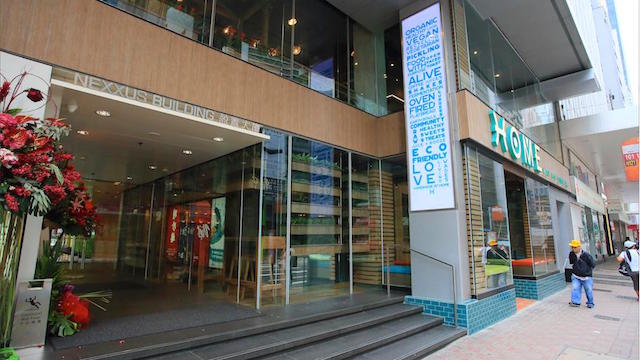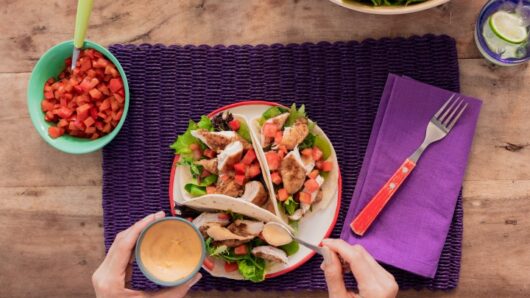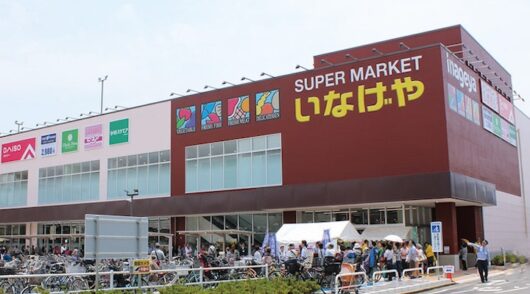In a former Burger King outlet in Central, Home: Eat to Live serves up a similarly fast-food concept, but with the focus on healthy vegetarian meals such as the Polar Bear burger (a beetroot, mushroom and oat patty) and the Silky Sifaka earth bowl, a take on Vietnamese pho. Soon, it will become a chain.
All items on the menu are free of meat and fish, preservatives and processed ingredients.
Vegan desserts such as hazelnut chocolate cake can be paired with fair-trade coffee, while in the evening the bar serves cocktails mixed with organic spirits, such as Jade Supercharged (tequila, kale, spinach, green pepper, green apple and parsley). To reduce its carbon footprint, the restaurant sources ingredients from farms across Hong Kong, including from partner farm Kau Kee in the New Territories. Products that cannot be sourced locally are imported from Malaysia, Taiwan, Thailand and other regional centres.
“We’ve designed a menu that we feel caters to everyone, whether they’re craving a bowl of noodles or Middle Eastern flat breads,” says founder/CEO Christian Gerard Mongendre, who graduated from the Institut Paul Bocuse and worked for Michelin three-star chef Alain Ducasse. The Hong Kong-born chef also co-founded vegetarian restaurant Mana!.

Brand aspiration
A vegetarian, Mongendre wants to educate people that meat-free cuisine need not be boring. “We want to appeal to the lawyers and bankers as well as the hippies and yogis. And with a name like Home, we feel that we have to appeal to everyone.”
Now Mongendre is keen to create an innovative fast-food brand by teaming up with ZS Hospitality Group. “When I first met with ZS, it seemed too good to be true as they were willing to offer me complete autonomy,” he says.
The group’s 22-year-old chairperson Elizabeth Chu follows a gluten-free diet, and Mongendre says he feels that she is the kind of person he wants as an investor. “There’s a real trust already established, and I think we’ll be able to roll out this concept quite easily – it’s the ideal scenario as she is fully aligned with it.
“We have the full support of ZS Hospitality as we are not just rolling out another concept in Hong Kong, but are focused on creating a sustainable restaurant model. Hopefully, we’ll be an inspiration to other restaurants.”

Creating a sustainable restaurant model means it will take longer than usual to turn a profit, as the quality of ingredients is integral to its success. “All our packaging is more expensive as well, because we use only biodegradable corn plastic and Forest Stewardship Council-certified paper. We even pay a driver to take our compost daily back to the farm to make fertiliser,” says Mongendre.
While making dishes without processed sugars or dairy can be challenging, he believes Hong Kong palates are more receptive to healthy, clean eating than perhaps ever before. “I got to experience the audience for this food with Mana!, and saw there was a real need for this. We want to generate more demand for our food at Home so we can create economies of scale.”
Fast, not slow
Vegetarianism and healthy eating are usually aligned more closely with the slow food movement, but Mongendre feels this is not the right concept for time-pressed Hong Kongers seeking fast lunches and quick dinner options.
“If you look at the restaurant market, about 70 to 80 per cent of brands are fast food. My goal was always to feed every type of person in a fast manner. Just because it’s fast doesn’t mean it can’t be elegant and nice and tasty, and fast food is the best way to reach a big market,” he says.
Meanwhile, the restaurant is focused on sourcing more local organic produce. “We’ve just put some planters on the rooftop farm and want to build other facilities so we can have more local organically grown food and rely less on imported ingredients,” says Mongendre.
“Right now, it’s all about building networks, so we’re doing things like organising farmer’s dinners so they can taste our food and understand our concept.”
Once more organic produce becomes available, Mongendre hopes to expand around Central district and perhaps open a restaurant in Kowloon. A second outlet may possibly open by the end of the year.
“Being in Hong Kong has been amazing,” he says. “I came here and didn’t even ask for a job, but was offered one. Then six months later, I had the chance to create my own restaurant. It took me one week to find a business partner and secure a location for Mana! – it’s incredible. There’s such a high energy in Hong Kong, it’s almost overwhelming, but there are lots of good opportunities.”
Mongendre eventually wants to take his healthy fast-food idea across Asia. “The timing is right to expand this concept, and I think we can become a reliable brand for people who want more out of fast food.
“At the moment, we’re considering Vietnam and China, which will be the biggest market for health food globally by 2020,” he says. “After so many food scares, China is definitely waking up to healthy food.”
- This article was first published in Hong Kong Means Business, a website of the Hong Kong Development Council (HKDC).






